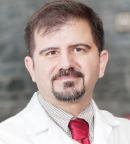
Armin Shahrokni, MD
“Older and frail adults with cancer are the types of patients we deal with every day,” said Armin Shahrokni, MD, a geriatric oncologist at Memorial Sloan Kettering Cancer Center in New York. “The GO2 study is important, and I suspect it will be practice-changing,” he predicted.
Older and frail adults comprise a substantial proportion of all patients with cancer, yet they are excluded from most clinical trials. “In the United States, there is no clear definition of frailty, so oncologists may treat an older or frail adult with cancer the same as a younger patient or an older but fit patient,” he explained.
Is Chemotherapy Appropriate?
“The patients included in the GO2 trial had a short progression-free and overall survival, so one might question the need for chemotherapy. One could argue that palliative care and supportive care focused on symptoms would be more appropriate in this patient population. Despite the advances in incorporating palliative care, the oncology community in the United States would have a long way to go to fully embrace such a concept,” he continued.
Dr. Shahrokni continued: “Many oncologists, patients, and caregivers may not accept palliative care at the time of diagnosis of advanced cancer. Some patients and their caregivers may want to try chemotherapy to see whether it will work, so there may be pressure to treat them. There is no standard of care in the United States for older or frail adults with cancer, so they may receive the standard of care for younger patients.”
“This study is valuable because it makes the important point that even 60% of the standard dose of chemotherapy could be as effective as full-dose therapy and has a better safety profile,” commented Dr. Shahrokni. “With this information, I will not be afraid to advise my patients with advanced gastroesophageal cancer who want to be treated that they can start treatment with dose-reduced chemotherapy. For patients who are not willing to enroll in palliative care and want to receive treatment for cancer, this study provides evidence that we can start with a lower dose of chemotherapy and still provide benefit.”
Praise for the OTU Tool
Dr. Shahrokni had high praise for the OTU tool used in this study. “This tool incorporates safety of the treatment along with disease response to the treatment. The concepts behind its development apply well to older patients. We geriatric oncologists are trying to introduce assessments such as this one into clinical trials. The OTU tool is a great parameter, and I hope this or similar parameters that reflect a more holistic approach toward cancer outcomes becomes standard for all clinical trials regardless of age and disease,” he stated.
Furthermore, Dr. Shahrokni explained the need for a tool like the OTU: “If a patient is treated with chemotherapy, suffers toxicity that requires a 6-month hospitalization, and then lives for 6 months and 1 day, his overall survival would be 6 months and 1 day. However, he would have very limited quality of life most of the time, and the OTU tool takes that into consideration.” ■
DISCLOSURE: Dr. Shahrokni reported no conflicts of interest.

